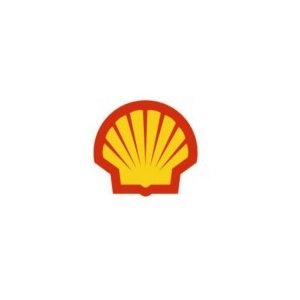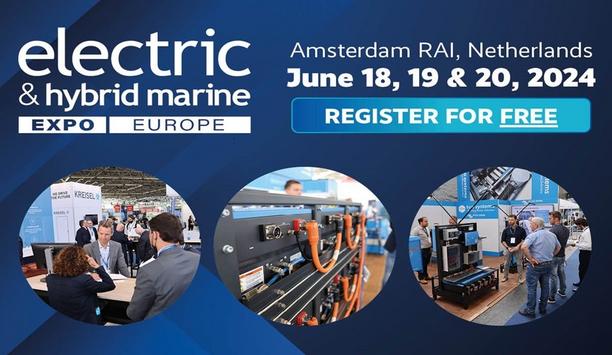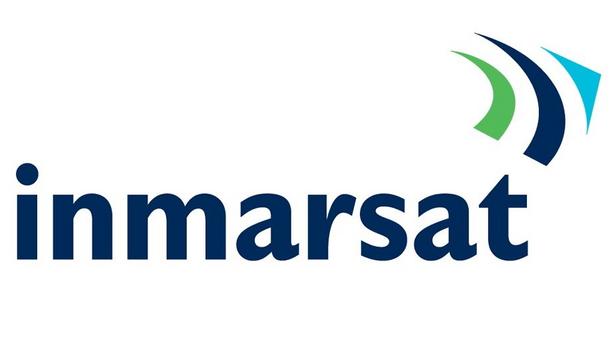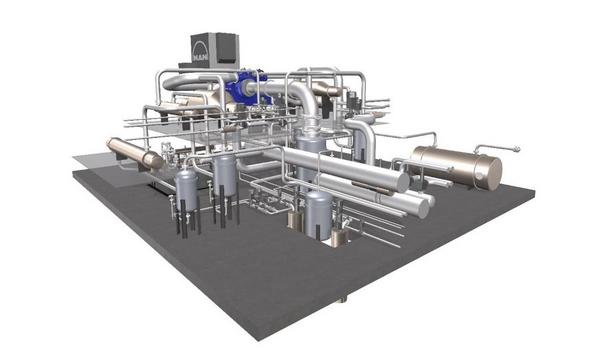Shell Marine - Experts & Thought Leaders
Latest Shell Marine news & announcements
One of the world’s major exhibitions and conferences for maritime electrification, decarbonisation, and GHG reduction solutions will once again dock in Amsterdam this June. Electric & Hybrid Marine Expo Europe will feature 200+ exhibitors under one roof, PLUS a full three-day conference programme with 40+ expert speakers! Hosting industry pioneers Taking place at the Amsterdam RAI in the Netherlands, on June 18, 19 & 20, the event will host over 200 exhibitors, including industry pioneers such as ABB, Rolls-Royce Solutions, Volvo Penta, Wärtsilä, Zinus, and Speedgoat – to name just a few! Alongside the exhibition is a world-pioneering conference featuring over 40 speakers, plus a separate conference on autonomous ship technology. Global event for suppliers and engineers Throughout the event, there will be plenty of networking opportunities to meet new suppliers and reconnect This is a global event for suppliers and engineers of electric hybrid and autonomous marine systems to meet and discuss a more sustainable future and the technologies that will make it happen. Throughout the event, there will be plenty of networking opportunities to meet new suppliers and reconnect with industry peers. Fast-track the fleet’s move to more sustainable operations by attending the world’s pioneering event for marine electrification, decarbonisiation, hybridisation, future fuels, shore charging, and low-carbon shipping solutions. Propulsion solutions Entrance to the exhibition is free of charge – just visit the event website to register for an entry pass. The show is ideal for companies ranging from small regional ferry fleet operators keen to reduce costs, to international shipowners and operators wanting to learn more about tomorrow’s propulsion solutions, as well as boat builders and engine makers concerned about the latest emissions legislation. Three-day conference programme The event brings together R&D experts and engineers from across the marine sector, providing one of the best networking opportunities of the year. The three-day conference programme (for which rates apply) will bring together attendees from around the world to listen to over 40 expert maritime engineering and academic speakers from organisations including DNV, GE Power Conversion, Port of Amsterdam, Polish Register of Shipping, Rolls-Royce, the Maersk McKinney Moller Center for Zero Carbon Shipping, Wärtsilä Marine, Shell Marine, and Vard Group. Elias Boletis' presentation Unpick questions about the drivers of technological progress toward decarbonisation in the marine sector Key highlights include a presentation from Elias Boletis, chair of the CIMAC Working Group 10. The working group provides a link between shipowners and the equipment manufacturers for the marine sector, and Elias’s presentation – The challenges to ship owners in the decarbonisation process, and the responsibilities of equipment manufacturers – will unpick questions about the drivers of technological progress toward decarbonisation in the marine sector. Are they pulled along by demand from shipowners or pushed forward by equipment manufacturers? What are the implications of either approach? Which would be best and should either do more of the same, less, or something entirely different? This is a must-see presentation for any shipowner, OEM, or equipment manufacturer who wants to understand how the technology enters the market and is applied to shipping. Autonomous ship technology Another feature of the show is an area for autonomous ship technology, which has its conference programme where ship designers, classification societies, fleet owners, naval architects, research organisations, and equipment suppliers will discuss the developments needed to make autonomous operations a reality and improve efficiency. The expo will also host the revamped Electric & Hybrid Marine Awards, with a host of categories to better reflect the scale of innovation across the maritime propulsion industry. Next-gen e-outboard At the expo, Volta Future will present a revolutionary e-outboard with 222kW (300hp) continuous power and 790Nm. The next-gen e-outboard is called iWOP, which stands for invisible waterline outboard power drive. The housing of the iWOP is much more compact than classic outboard housings and contains two specially developed, high-performance electric motors together with a directly cooled double inverter. Unlike other outboards on the market, the iWOP can be mounted not only on boats with transom (outboard) but also on boats with (normally) inboards instead of the sterndrive, enabling the provision of a bathing platform instead of an engine housing. Solid-state batteries As overcharge, over-discharge, short circuits and similar issues have minimal impact other than reducing battery life EPTechnologies will showcase solid-state batteries, which the company says represent a significant advance in battery technology. Unlike traditional lithium-ion batteries, which use liquid electrolytes, solid-state batteries do not. This fundamental difference enhances safety, cycle life, and overall performance. They can be overcharged, heated to extreme values, and even punctured with a projectile with no ill effects. This opens new possibilities for applications. For instance, EPTechnologies can develop batteries equipped with a hardware override switch to bypass all electronic control systems if necessary. As overcharge, over-discharge, short circuits and similar issues have minimal impact other than reducing battery life, users can be assured of accessing the power they need, regardless of the situation. Vigilant 600 forward-looking sonar (FLS) At the Autonomous Ship Expo, Wavefront Systems will present its new Vigilant 600 forward-looking sonar (FLS). Complementing the company’s Vigilant 1000 and 1500 systems, it allows autonomous surface and subsurface vessels to transform their underwater situational information. The provision of real-time navigational and obstacle avoidance data to onboard or remotely controlled systems enables safer operations in unfamiliar or dynamic environments by dramatically reducing the risk of collisions or grounding. Patented technology capable of depth-finding at ranges ahead of the vehicle over 20 times the prevailing water depth, combined with real-time data on poorly charted seabed features and water column obstacles, enables reactive navigational autonomy.
Inmarsat, the globally renowned company in global, mobile satellite communications, has unveiled e-learning technology and service provider, Marine Learning Systems (MLS) as the winner of the inaugural Inmarsat Ferry Open Innovation Challenge, a competition inviting start-ups and SMEs to propose digital solutions that promise to enhance the working lives of ferry crews. Launched in January 2022, in collaboration with the largest ferry operator in Greece, Attica Group, and UK digital consultancy firm, Thetius, the Ferry Open Innovation Challenge sought entries in five innovation areas - familiarisation training for new crew, continuous regulations training, onboard safety training, onboard customer services training and the enrichment of crew leisure time. Marine Learning Systems, the winning entrant The winning entrant, Marine Learning Systems, has secured a £10,000 cash grant to fund a proof of concept The winning entrant, Marine Learning Systems, has secured a £10,000 cash grant to fund a proof of concept for its end-to-end seafarer training solution, on-board Attica Group’s ferry - Superfast XI. Comprising the MarineLMS learning platform and SkillGrader assessment tool, the MLS proposal addresses four training-related challenge areas. The solution improves familiarisation for new crew members by supporting custom content and blended learning. It enables continuous regulations training, by offering crew easy access to course content and on-demand reporting. It improves customer services training, by providing interactive content on guidelines and procedures that can be updated at any time. Finally, MLS enhances safety with standardised exams, in order to test crew knowledge of emergency procedures. Inmarsat, Attica Group, Thetius and MLS partnership Inmarsat Maritime’s Senior Vice President, Peter Broadhurst, part of the panel of seafarers and Inmarsat and Attica Group representatives responsible for selecting the winning entry, said “Marine Learning Systems is a worthy winner of the inaugural Ferry Open Innovation Challenge in crew training and entertainment, proposing a solution that addresses not one, but four of the five innovation challenge areas. Inmarsat now looks forward to working with Attica Group and Thetius, as we support MLS in implementing its proof of concept on board Superfast XI.” “Attica Group employees join an organisation that has guiding principles of integrity, innovation, quality, transparency and corporate responsibility, and one where training opportunities focus on personal and professional development,” said Babis Katzourakis, Director - Information Technology & Telecommunications Division at Attica Group, adding “We look forward to providing MLS with the support it needs, to trial and refine this very promising digital training tool.” Developing training content and skill assessment forms MLS will use its secured funding to develop Attica Group-specific training content and skill assessment forms, as well as dashboards and reports, targeting knowledge gaps and training effectiveness. All content and applications will be accessible via mobile device or existing on-board computers, with Inmarsat’s Fleet Connect providing dedicated bandwidth, in order to allow users to reach the MLS-configured remote training servers, without interfering with vessel operations or crew communications. Advancing mariner safety and performance with technology Marine Learning Systems is committed to advancing mariner safety and performance through technology" Murray Goldberg, the Founder and Chief Executive Officer (CEO) of Marine Learning Systems, said “We’re incredibly honoured and pleased to be chosen as the winner of Ferry Open Innovation Challenge. Marine Learning Systems is committed to advancing mariner safety and performance through technology that enables targeted, effective and measurable training. We are excited to learn from and work alongside Attica, Thetius and Inmarsat to support their efforts in improving crew training at sea.” Nick Chubb, the Founder and Managing Director, Thetius, said “This challenge saw high-quality entries come in from start-ups and SMEs around the world, and with four outstanding candidates making the shortlist, judging in the final round was incredibly difficult.” Ferry Open Innovation Challenge Nick Chubb adds, “That said, we are delighted that Attica Group and Inmarsat have chosen to work with Marine Learning Systems. The company’s proof of concept will enable value-added educational services for ferry personnel in four key areas of training.” In a further demonstration of Inmarsat’s commitment to promoting crew welfare through innovation, the Ferry Open Innovation Challenge follows the inaugural Crew Welfare Open Innovation Challenge, which Inmarsat launched with Thetius and Shell Shipping & Maritime in 2020. Canary Sentinel and Workrest won the 2020 Challenge for their intelligent fatigue management and rest coaching platform.
Dalian Shipbuilding Industry Co. Ltd. has ordered 2 × MAN B&W 7S35ME-GI dual-fuel engines in connection with the construction of two 7,500 cubic-metre, liquid CO2 carriers for Northern Lights, the joint venture between Equinor, Shell and TotalEnergies. Each ME-GI engine will feature MAN Energy Solutions’ proprietary EcoEGR (Exhaust Gas Recirculation) system. Delivery of the 130-metre carriers has been set for mid-2024. Carbon-capture-and-storage (CCS) project Northern Lights is responsible for developing and operating CO2 transport and storage facilities, as part of ‘Longship’, the Norwegian Government’s full-scale, carbon-capture-and-storage (CCS) project. Northern Lights will create the first ever, cross-border, open-source, CO2 transport-and-storage infrastructure network, offering European companies the opportunity to store their CO2 safely and permanently underground. Keeping carriers’ CO2 emissions to a minimum Our dual-fuel ME-GIs will keep carrier emissions to a minimum in this project" Wayne Jones OBE, the Chief Sales Officer and Member of the Executive Board of MAN Energy Solutions, said “We are delighted with our role in this ground-breaking project. With the current focus in the maritime world on reducing methane slip, our dual-fuel ME-GIs will keep carrier emissions to a minimum in this project, whose green credentials will be carefully examined.” Wayne Jones OBE adds, “These vessels’ construction enables the revolutionary development of a flexible and efficient, European infrastructure for CO2 capture from industrial customers. I am convinced that the Northern Lights project has great potential for application across Europe.” The newbuilding carriers will be used in the first phase of Northern Lights’ transport-and-storage-infrastructure development and are designed to transport liquid CO2 in purpose-built, pressurised cargo tanks. Dual-fuel ME-GI engines The dual-fuel ME-GI engines will mainly run on LNG, while other innovative technologies, such as wind-assisted propulsion system and air lubrication, will be installed to reduce carbon intensity by around 34%, compared to conventional systems. The ships are the first of their kind and have the potential to set a new standard for CO2 shipping on coastal trading routes. The Northern Lights project allows for further phases to expand capacity through future investments triggered by market demand from large CO2 emitters across Europe. Norcem carbon-capture project Longship project aims to demonstrate that carbon-capture technology can be applied to larger industrial plants The Norwegian Government’s Longship project aims to demonstrate that carbon-capture technology can be applied to larger industrial plants and set a new standard for future industrial projects. The HeidelbergCement Norcem plant, located near Oslo, Norway, will be the first to use the Carbon Capture Heat Recovery technology (CCWHR), developed by MAN and Aker Carbon Capture, from the summer of 2024, when it will capture 400,000 tons of CO2 annually, corresponding to 50% of its overall emissions. Compressed, liquefied gas The gas will be compressed, liquefied and subsequently transported by Northern Lights, by use of the new carriers, to their onshore receiving terminal, located near Bergen in western Norway, from where a pipeline will lead to an underground storage location, in the North Sea. Dr. Uwe Lauber, the Chief Executive Officer (CEO) of MAN Energy Solutions, said “CO2 emissions are currently unavoidable in cement production, with the sector accounting for almost 6 - 7% of the world’s carbon-dioxide emissions. This is why the cement industry is key on the road to a decarbonised future.” Energy-efficient solution Dr. Uwe Lauber adds, “We are very proud to be able to deliver such an energy-efficient solution for HeidelbergCement Norcem, which is the result of our successful pioneering work in the CCS field together with Aker Carbon Capture.” MAN Energy Solutions’ scope of supply for the cement factory includes an electrically-powered compressor train – Type RG 63-7 with integrated CCWHR technology, which allows the compression heat of the recovery compressor to be exploited. The steam generators cool the CO2 mixture between the compressor stages and generate steam that is, in turn, used for capture.






